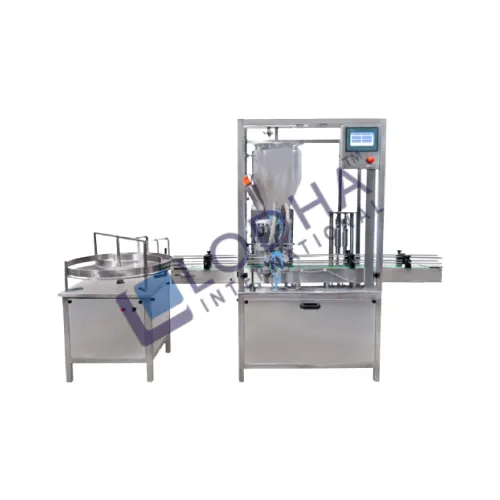
Lodha International LLP is a leading manufacturer of Injectable Filling Machines, dedicated to revolutionizing the way pharmaceutical companies handle the delicate process of filling injectable products. When it comes to manufacturing injectable medicines, precision, safety, and efficiency are non-negotiable. The world of injectables is filled with complexity – whether you're producing vaccines, biologics, or antibiotics – making sure that the filling process is flawless is essential. And that’s where injectable filling machines come into play, streamlining the process to guarantee the safety and quality of these life-saving drugs.
With the growing demand for injectable medicines across the globe, pharmaceutical companies need reliable, high-performance machines to keep up with the increasing production needs. But choosing the right injectable filling machine isn’t as simple as picking one off the shelf. Several factors need to be considered, from the type of injectable product to the level of automation required. A well-chosen machine can improve productivity, reduce human error, and maintain the stringent standards required in the pharmaceutical industry. In this, we will break down the important factors to help you select the perfect injectable filling machine for your needs. From product characteristics to machine speed and compliance requirements, we’ll cover everything you need to make an informed decision. Whether you’re scaling up your operations or looking to improve efficiency in your existing facility, this guide will help you understand the core elements of selecting the right machine. So, let’s dive in!
The filling accuracy of an injectable filling machine can make or break your product. Too little or too much product in the vial can lead to significant losses and even harm patient safety. That’s why precision is paramount in the design of an injectable filling machine.
Machines that use volumetric filling systems, for instance, provide the highest level of accuracy, making sure that each vial receives exactly the right dose. Features like feedback mechanisms, flow meters, and electronic sensors all work together to make sure consistent and precise filling. These machines offer low tolerances in terms of filling variations, making them indispensable in the production of injectable medicines.
Key Considerations:
The level of automation in an injectable filling machine is another key factor to consider. Automation can dramatically increase efficiency, reduce the risk of human error, and maintain consistent product quality. Automated filling machines handle the entire filling process, from the transfer of product to the final capping, without requiring manual intervention.
A fully automated injectable filling machine can significantly improve throughput, making it an ideal choice for large-scale manufacturers. On the other hand, semi-automatic machines offer more flexibility, making them suitable for smaller production runs or pilot projects.
Key Considerations:
When manufacturing injectables, cleanliness is not just a preference; it’s a necessity. Injectable medicines are administered directly into the bloodstream or tissue, making sterility and hygiene the highest priorities. Injectable filling machines must be designed with these concerns in mind, featuring easy-to-clean surfaces and components.
Machines that incorporate clean-in-place (CIP) functionality or that are housed in controlled environments like isolators or clean rooms make sure that no contamination occurs during production. Stainless steel surfaces and sealed components help maintain the sterile conditions required for injectable production.
Key Considerations:
Speed matters when it comes to pharmaceutical manufacturing, but it should never come at the cost of accuracy or product quality. Different injectable filling machines offer different production speeds, so it’s essential to choose a machine that fits your production goals.
For high-volume production lines, a high-speed injectable filling machine can keep up with demand without compromising quality. However, for small batch productions or pilot-scale manufacturing, machines that offer adjustable filling speeds and easy changeover between products may be more suitable.
Key Considerations:
Another important factor when selecting an injectable filling machine is the compatibility with the type of material and container you’ll be using. Injectables are typically filled into glass vials, pre-filled syringes, or other containers. It’s essential to make sure that the machine can accommodate the materials of your packaging to avoid breakage, contamination, or inefficient filling.
Moreover, injectable filling machines must be able to handle different sizes and shapes of containers, from small vials to larger bottles, without compromising the filling accuracy or machine efficiency.
Key Considerations:
In the highly regulated pharmaceutical industry, every piece of equipment used in production must meet stringent regulatory standards. Regulatory bodies like the FDA and EMA require that machines used for filling injectable products comply with Good Manufacturing Practices (GMP) and other relevant guidelines.
Look for injectable filling machines that come with the necessary certifications and that have been designed to support full traceability and documentation, as this will help in the event of an audit or regulatory review.
Key Considerations:
While it’s tempting to opt for the cheapest option, the true value of an injectable filling machine lies in its ability to increase efficiency, reduce errors, and improve overall productivity. Consider the upfront cost in conjunction with the long-term ROI. A more expensive machine with better features may lead to fewer breakdowns, less downtime, and improved production, ultimately providing a higher ROI in the long run.
When evaluating injectable filling machines, factor in the costs of maintenance, training, and any potential upgrades required over time.
Key Considerations:
The right injectable filling machine should come with excellent after-sales support. This includes easy access to replacement parts, troubleshooting assistance, and operational training. At Lodha International, we pride ourselves on offering unparalleled support to our customers, making sure that your machines continue to run smoothly throughout their lifecycle.
Key Considerations:
Our company offers complete packaging lines and processing equipment used in the production, quality control and formulation labs of pharmaceutical, dietary supplements, food, cosmetic and chemical industries. We offer a full range from production scale to small batch manufacturing equipment ideal for liquids, injectables, tablets, capsules, powders, creams and ointments.
Explore
